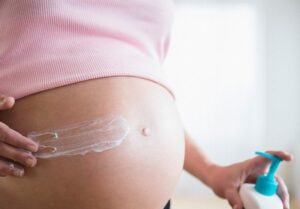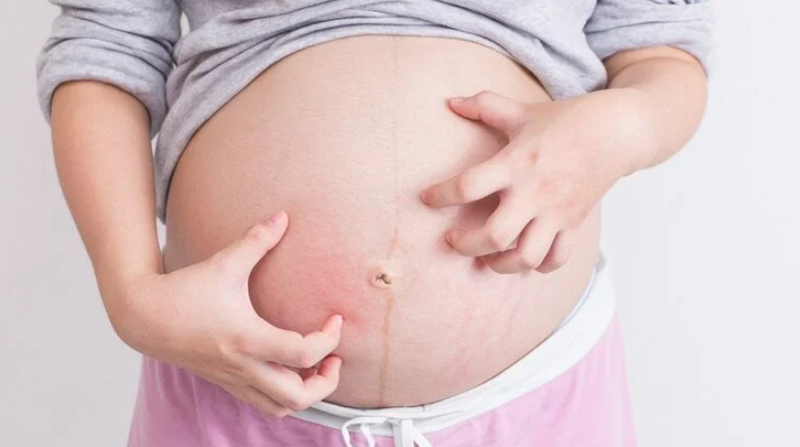Pregnant women experiencing itching all over or in specific areas during pregnancy is a common symptom. Itching in the last month of pregnancy often makes pregnant women feel uncomfortable and even worried about whether itching during pregnancy is dangerous.
1. What causes itching during pregnancy?
Itching during pregnancy is a common condition among many pregnant women as this is when a woman’s body undergoes many physical and psychological changes, specifically:
- The immune system and hormones in the body change.
- The fetus develops inside the uterus, stretching, expanding, and even causing dry skin.
- Pregnant mothers may suffer from dermatological conditions such as hives or allergies.
Itching during pregnancy can be recognized through signs such as:
- Redness and itching in the palms and soles.
- Rashes or itching all over the body.
- Stretch marks causing itching on the breasts, abdomen, thighs, and buttocks (usually occurring at the end of pregnancy).
2. Is itching during pregnancy dangerous?
Usually, the condition of itching during pregnancy is not dangerous and does not affect the fetus.
Pregnant women experiencing itching often feel uncomfortable and fatigued, especially in the later months of pregnancy when the fetus grows rapidly in size, or when itching occurs during hot weather leading to excessive sweating. Itching causes pregnant women to scratch and can lead to skin abrasions, which may be cosmetically unappealing.
But pregnant women can rest assured that these itching sensations do not last long; after giving birth, this uncomfortable itching will disappear.
However, if itching during pregnancy is accompanied by abnormalities or other symptoms, the pregnant mother should immediately go to a medical facility for examination and health check by specialists:
- A pregnant woman experiencing all-over itching accompanied by jaundice: This may be a sign that the pregnant woman is experiencing cholestasis of pregnancy in the liver. Bile is accumulated and stagnated in the liver, causing all-over itching, burning pain, and reddening due to scratching and abrasions.
- A pregnant woman experiencing itching along with scaly skin lesions: This may be a manifestation of other dermatological diseases such as psoriasis, eczema, etc.
- A pregnant woman with a rash accompanied by fever: This may be a manifestation of chickenpox or diseases caused by the herpes virus…
- A pregnant woman experiencing itching along with burning in the vaginal area: This may be indicative of sexually transmitted diseases or vaginal infections from fungi or bacteria.
3. What should you do if you experience itching during pregnancy?
Itching during pregnancy causes many inconveniences in daily life. To avoid damaging the skin due to itching, pregnant women should be careful:
- Limit scratching: Scratching more will make the pregnant woman feel itchier. Instead of scratching, the pregnant woman can use a cool or warm cloth or compress to apply to the itchy skin area.
- Moisturizing the skin and preventing stretch marks: Itching during pregnancy due to dry skin and stretch marks can be addressed and prevented by using natural oils and creams such as almond oil, coconut oil, and sunflower oil. However, when applying cream to the belly, pregnant women should apply gently to avoid irritation and uterine contractions. Pregnant women should also limit long baths with hot water and avoid using harsh scrubbing tools on the skin to reduce itching, as this can dry the skin further.
- Maintaining body hygiene: To keep the body clean and help soothe itching during pregnancy, pregnant women should choose shower gels that do not irritate the skin and have a suitable pH level. Avoid using skincare products with high sodium content as they may cause more itching due to skin irritation. Pregnant women can soak in green tea to soothe itching.
- Maintaining hygiene in the intimate area: Vaginal infections during pregnancy are very dangerous as they can affect the fetus. Therefore, pregnant women need to pay attention to keeping the intimate area clean and dry, avoiding moisture. Using women’s hygiene solutions with the appropriate pH level and avoiding overuse is important to not affect the vaginal environment, allowing bacteria and fungi to thrive. Washing the intimate area with fresh tea leaves is also a way to reduce itching.
- Limiting exposure to dust, smoke, and allergens: Itching during pregnancy may worsen when damaged skin comes into contact with allergens that can cause itching.
- Eat a balanced diet and drink enough water every day: Pregnant women should increase their intake of foods rich in vitamins (such as vitamins A, D, etc.), minerals, and fiber to ensure proper nutrition during pregnancy. Additionally, it is important to avoid foods that are high in spices and heat, such as pepper and chili, as they can aggravate itching during pregnancy.
- Engage in light exercise: Regularly engaging in gentle movements and exercises, such as walking, will help improve blood circulation in the body.
- Wear cotton clothing: Pregnant women should choose clothing made from soft, breathable cotton that absorbs well and does not irritate the skin. Light-colored clothing is recommended to avoid heat absorption when outdoors in the sun.


